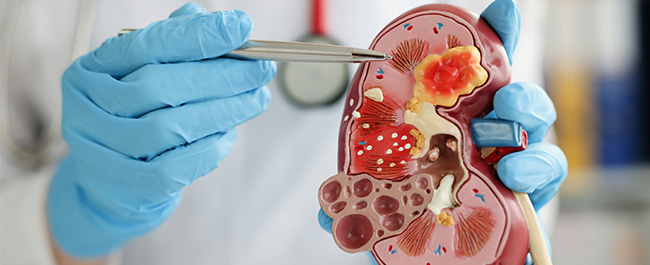Transforming care for patients vulnerable to irreversible kidney failure

Research leads to more targeted and less damaging therapy for nephrotic syndrome.
Research highlights
- More effective targeting of treatment.
- Improvements in kidney transplant outcomes.
- Significant cost savings for the NHS.
- Massive new investment in renal research.
Steroid resistant nephrotic syndrome (SRNS) is a devastating disease of kidney filtration that leads to substantial and unremitting protein loss into urine.
Traditionally, healthcare providers have treated the condition with heavy immunosuppressive regimes that have limited benefit and result in massive morbidity. Over 60% of patients who receive this treatment suffer irreversible kidney failures that require a transplant, often with a significant risk of the condition reoccurring.
Now the picture is changing. Bristol research has informed new clinical practice guidelines that make treatment more targeted, more effective and less harmful. The research has also saved healthcare services millions and generated inward UK investment totalling over £50m in spin out partnerships.
Critical cell research
The Bristol research initially focused on revealing underlying molecular mechanisms based on the glomerular podocyte, the central cell of the kidney filtration barrier.
In 2002, the team led by Professor Moin Saleem and Professor Richard Coward was the first to develop conditionally immortalised human podocyte cell lines that have since become the international gold standard tool for developments in podocyte biology.
Saleem and Coward also established both a gene panel test for podocyte monogenic disorders and a national nephrotic syndrome patient register with over 3,500 participants.
Combined, this work helped distinguish genetic forms of SRNS from immune based SRNS. It also further sub-classified the immune-based form of SRNS to help target patients who will respond to specific therapies or transplantation.
Changes to national and international clinical practice
The UK Genetic Testing Network approved the gene panel test developed by Saleem and Coward was approved for clinical use in 2014. Since that time the test has been applied to 1,000 UK and international patients - enabling healthcare providers to stratify patients to enable less toxic therapies tailored to the individual.
In a 2020, 100% of UK paediatric nephrologists surveyed confirmed that the new pathway had changed their clinical practice. In particular, nephrologists noted the positive impact of removing the need for trial-and-error immunosuppression, which can lead to mood changes, hypertension, poor growth, weight loss, infection and hair loss.
The gene panel test has also improved kidney transplant outcomes by predicting which patients will get a recurrence of disease (depending on whether they have the genetic or non-genetic form of SRNS). This has led to improvements in both patient counselling and the choice of live related kidney donors.
The UK Genetic Testing Network has estimated that the cost saving to the UK NHS of implementing this new clinical pathway is £68,900 per patient, or £5-10m per year.
Global impact and investment
The Bristol research findings have made an impact around the world. The International Pediatric Nephrology Association (IPNA) incorporated gene panel testing into its first clinical practice recommendation for children with SRNS – resulting in standardisation of care across IPNA members in 105 countries and eight regional paediatric nephrology societies.
The research has also led to significant inward investment in renal research into the UK. In parallel with the development of gene technology development and testing, Saleem and Coward initiated the UK Renal Rare Disease Registry, which now forms the core repository of NURTuRE (National Unified Renal Translational Research Enterprise).
Since 2018, NURTuRE has established a sustainable infrastructure with collaborative industry partners including AbbVie Inc, Evotec AV, UCB Celltech Biopharma, Retrophin and AstraZeneca, with a total of £7.7m investment. So far, human podocyte and glomerular endothelial cell lines have been licensed to 15 of the world’s top 20 Pharma companies for internal R&D and drug screening.
Bristol’s research has also led to Syncona, a major life sciences investment firm, making an initial £45m investment in forming Purespring, the world’s leading renal gene therapy spinout company.
UK-based Purespring now employs over 20 researchers and directly targets podocyte diseases – providing significant hope that this extension of the research started at Bristol will benefit many more patients around the world.
The test has been applied to over 1,000 UK and international patients - enabling healthcare providers to stratify patients to enable less toxic therapies tailored to the individual.
Connect with the researcher
Professor Moin Saleem, Bristol Medical School.
Cite the research
- Saleem MA, O’Hare MJ, Reiser J, Coward RJ, Inward CD, Farren T, Xing CY, Ni L, Mathieson PW, Mundel P. (2002). A conditionally immortalized human podocyte cell line demonstrating nephrin and podocin expression. Journal of the American Society of Nephrology, 13, 630–638.
- McCarthy HJ, Bierzynska A, Wherlock M, Ognjanovic M, Kerecuk L, Hegde S, Feather S, Gilbert RD, Krischock L, Jones C, Sinha MD, Webb NJA, Christian M, Williams MM, Marks S, Koziell A, Welsh GI, Saleem MA on behalf of RADAR the UK SRNS Study Group (2013). Simultaneous sequencing of 24 genes associated with steroid-resistant nephrotic syndrome. Clinical Journal of American Society of Nephrology, 8, 637–648.
- Sen ES, Dean P, Yarram-Smith L, Bierzynska A, Woodward G, Buxton C, Dennis G, Welsh GI, Williams M, Saleem MA. (2017). Clinical genetic testing using a custom-designed steroid-resistant nephrotic syndrome gene panel: analysis and recommendations. Journal of Medical Genetics, 54, 795–804.